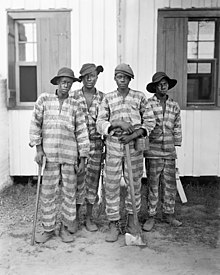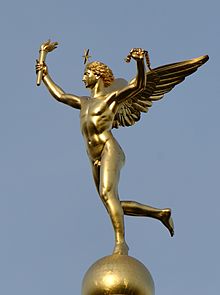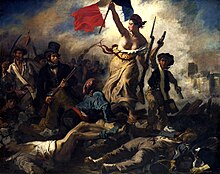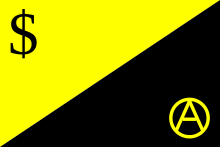Libertarianism
political philosophy and movement that upholds liberty as a core principle
This article is about the political philosophy and movement that uphold liberty as a core principle. For the type of libertarianism stressing both individual freedom and social equality, see Left-libertarianism.





Libertarianism (from Latin: libertas, meaning "freedom") is a political philosophy and movement that upholds liberty as a core principle. Libertarians seek to maximize political freedom and autonomy, emphasizing individualism, freedom of choice and voluntary association. Libertarians share a skepticism of authority and state power, but they diverge on the scope of their opposition to existing economic and political systems.












A
edit- In markets where freedom of choice is hampered by inadequate information, or where rational choice requires extraordinary expertise, there is no acceptable alternative to government regulation. Contrary to libertarian preachments, it would be imprudent to expect an air traveler to do research required to avoid unsafe airlines, or for the automobile buyer to find out which cars are affected with rear-wheel lockup, or for the pregnant woman to conduct chemical tests to avoid drugs which may kill or deform her unborn child. Here social regulation is imperative, either by providing indispensable information to consumers or by prohibiting hazardous products outright. Here the privilege of free choice in a free market is the freedom to play Russian roulette with health and safety, and to impose the cost of death or injury on families or society.
- Walter Adams and James Brock, in The Bigness Complex (1986), p. 235
- Libertarians are self-governors in both personal and economic matters. They believe government's only purpose is to protect people from coercion and violence. They value individual responsibility, and tolerate economic and social diversity.
- He always pictured himself a libertarian, which to my way of thinking means "I want the liberty to grow rich and you can have the liberty to starve". It's easy to believe that no one should depend on society for help when you yourself happen not to need such help.
- Isaac Asimov, in I. Asimov : A Memoir (1994), p. 308
B
edit- Libertarians … advocate a high degree of both economic and personal liberty. Libertarians believe that people have the right to freely engage in both commercial and private activities. Libertarians consistently uphold the right of individuals to control their own lives in all respects.
- David Bergland, 1984 Libertarian Party presidential candidate, in Libertarianism In One Lesson (Ninth Edition, 2005)
- In the libertarian view, all human relationships should be voluntary; the only actions that should be forbidden by law are those that involve the initiation of force against those who have not themselves used force—actions like murder, rape, robbery, kidnapping, and fraud. Libertarians believe this code should be applied to actions by governments as well as by individuals.
- David D. Boaz, Libertarianism: A Primer, Free Press, (1998) p. 2
- Because libertarians do have a basic set of principles, you know that a libertarian will always come out on the side of any issue which maximizes personal liberty and responsibility — and which reduces government control over the individual.
- David Bergland, in Libertarianism In One Lesson (Ninth Edition, 2005)
- I am hard put to find something to say to people who still think libertarianism has something to do with liberty. A libertarian is just a Republican who takes drugs.
- Bob Black, in "The Libertarian as Conservative" (1984), published in The Abolition of Work and Other Essays (1986)
- There are libertarians who try to retrieve libertarianism from the Libertarian Party just as there are Christians who try to reclaim Christianity from Christendom and communists (I’ve tried to myself) who try to save communism from the Communist parties and states. They (and I) meant well but we lost.
- Bob Black, in "The Libertarian as Conservative" (1984), published in The Abolition of Work and Other Essays (1986)
- You might object that what I’ve said may apply to the minarchist majority of libertarians, but not to the self-styled anarchists among them. Not so. To my mind a right-wing anarchist is just a minarchist who’d abolish the state to his own satisfaction by calling it something else. But this incestuous family squabble is no affair of mine. Both camps call for partial or complete privatization of state functions but neither questions the functions themselves. They don’t denounce what the state does, they just object to who’s doing it. This is why the people most victimized by the state display the least interest in libertarianism. Those on the receiving end of coercion don’t quibble over their coercers’ credentials. If you can’t pay or don’t want to, you don’t much care if your deprivation is called larceny or taxation or restitution or rent. If you like to control your own time, you distinguish employment from enslavement only in degree and duration.
- Bob Black, in "The Libertarian as Conservative" (1984), published in The Abolition of Work and Other Essays (1986)
- The libertarian phobia as to the state reflects and reproduces a profound misunderstanding of the operative forces which make for social control in the modern world. If — and this is a big “if,” especially where bourgeois libertarians are concerned — what you want is to maximize individual autonomy, then it is quite clear that the state is the least of the phenomena which stand in your way.
- Bob Black, in "The Libertarian as Conservative" (1984), published in The Abolition of Work and Other Essays (1986)
- Unlike side issues like unemployment, unions, and minimum-wage laws, the subject of work itself is almost entirely absent from libertarian literature. Most of what little there is consists of Randite rantings against parasites, barely distinguishable from the invective inflicted on dissidents by the Soviet press, and Sunday-school platitudinizing that there is no free lunch — this from fat cats who have usually ingested a lot of them.
- Bob Black, in "The Libertarian as Conservative" (1984), published in The Abolition of Work and Other Essays (1986)
- Libertarians complain that the state is parasitic, an excrescence on society. They think it’s like a tumor you could cut out, leaving the patient just as he was, only healthier. They’ve been mystified by their own metaphors. Like the market, the state is an activity, not an entity. The only way to abolish the state is to change the way of life it forms a part of. That way of life, if you call that living, revolves around work and takes in bureaucracy, moralism, schooling, money, and more. Libertarians are conservatives because they avowedly want to maintain most of this mess and so unwittingly perpetuate the rest of the racket. But they’re bad conservatives because they’ve forgotten the reality of institutional and ideological interconnection which was the original insight of the historical conservatives.
- Bob Black, in "The Libertarian as Conservative" (1984), published in The Abolition of Work and Other Essays (1986)
- The issue should not be government. It should not be unlimited and unalloyed idolatry of personal property, which is the path that the libertarian movement has gone down.
- One difference between libertarianism and socialism is that a socialist society can't tolerate groups of people practicing freedom, but a libertarian society can comfortably allow people to choose voluntary socialism. If a group of people — even a very large group — wanted to purchase land and own it in common, they would be free to do so. The libertarian legal order would require only that no one be coerced into joining or giving up his property.
- Libertarians see the individual as the basic unit of social analysis. Only individuals make choices and are responsible for their actions. Libertarian thought emphasizes the dignity of each individual, which entails both rights and responsibility. The progressive extension of dignity to more people — to women, to people of different religions and different races — is one of the great libertarian triumphs of the Western world.
- Libertarianism is not libertinism or hedonism. It is not a claim that "people can do anything they want to, and nobody else can say anything." Rather, libertarianism proposes a society of liberty under law, in which individuals are free to pursue their own lives so long as they respect the equal rights of others. The rule of law means that individuals are governed by generally applicable and spontaneously developed legal rules, not by arbitrary commands; and that those rules should protect the freedom of individuals to pursue happiness in their own ways, not aim at any particular result or outcome.
- David D. Boaz, in "Key Concepts of Libertarianism" (1 January 1999)
- Libertarians have always battled the age-old scourge of war. They understood that war brought death and destruction on a grand scale, disrupted family and economic life, and put more power in the hands of the ruling class — which might explain why the rulers did not always share the popular sentiment for peace. Free men and women, of course, have often had to defend their own societies against foreign threats; but throughout history, war has usually been the common enemy of peaceful, productive people on all sides of the conflict.
- David D. Boaz, in "Key Concepts of Libertarianism" (1 January 1999)
- We should never define Libertarian positions in terms coined by liberals or conservatives — nor as some variant of their positions. We are not fiscally conservative and socially liberal. We are Libertarians, who believe in individual liberty and personal responsibility on all issues at all times.
C
edit- One of the more pretentious political self-descriptions is "Libertarian." People think it puts them above the fray. It sounds fashionable and, to the uninitiated, faintly dangerous. Actually, it's just one more bullshit political philosophy.
- George Carlin, in Napalm and Silly Putty (2002), p. 261
- The difference is libertarians strive for government to have a smaller economic footprint so that individuals can have a larger one.
- Jon Caldara“Caldara: Don’t believe the media hype, Jared Polis is no libertarian” The Complete Colorado (May 29, 2019)
- Vulgar libertarian apologists for capitalism use the term "free market" in an equivocal sense: they seem to have trouble remembering, from one moment to the next, whether they’re defending actually existing capitalism or free market principles. ... When prodded, they’ll grudgingly admit that the present system is not a free market, and that it includes a lot of state intervention on behalf of the rich. But as soon as they think they can get away with it, they go right back to defending the wealth of existing corporations.
- Kevin Carson, Studies in Mutualist Political Economy (2007), Chapter 4
- Libertarian in the United States has a meaning which is almost the opposite of what it has in the rest of the world traditionally. Here, libertarian means ultra right-wing capitalist. In the European tradition, libertarian meant socialist. So, anarchism was sometimes called libertarian socialism, a large wing of anarchism, so we have to be a little careful about terminology. I was drawn pretty early, maybe in the early teens, towards anarchist thinking and activities, and even spent a lot of time in anarchist bookstores and picking up pamphlets and talking to mostly Europeans who had fled or had been driven out of a pretty ugly continent in the 1930s.
- There's a long tradition of Anarchism — libertarian thought outside the United States, which is diametrically opposed to the positions of the Libertarian Party — but it's unknown here. That's the dominant position of what's always been considered Socialist Anarchism. Now, the Libertarian Party, is a capitalist party. It's in favor of what I would regard a particular form of authoritarian control. Namely, the kind that comes through private ownership and control, which is an extremely rigid system of domination — people have to... people can survive, by renting themselves to it, and basically in no other way... I do disagree with them very sharply, and I think that they are not … understanding the fundamental doctrine, that you should be free from domination and control, including the control of the manager and the owner.
- Noam Chomsky, in an appearance on Donahue/Pozner (14 February 1992)
- There isn't much point arguing about the word "libertarian." It would make about as much sense to argue with an unreconstructed Stalinist about the word "democracy" — recall that they called what they'd constructed "peoples' democracies." The weird offshoot of ultra-right individualist anarchism that is called "libertarian" here happens to amount to advocacy of perhaps the worst kind of imaginable tyranny, namely unaccountable private tyranny. If they want to call that "libertarian," fine; after all, Stalin called his system "democratic." But why bother arguing about it?
- I hear Republicans and Libertarians and so forth talking about property rights, but they stop talking about property rights as soon as the subject of American Indians comes up, because they know fully well, perhaps not in a fully articulated, conscious form, but they know fully well that the basis for the very system of endeavor and enterprise and profitability to which they are committed and devoted accrues on the basis of theft of the resources of someone else. They are in possession of stolen property. They know it. They all know it. It's a dishonest endeavor from day one.
- Ward Churchill, in Z Magazine, vol. 8, p. 32
D
edit- There is this very strong libertarian belief that inequality is not a proper area of study for economists. Even if you were to worry about inequality, it would be best if you just kept quiet and lived with it.
- Angus Deaton, quoted in Angus Deaton on inequality: 'The war on poverty has become a war on the poor' for The Guardian (7 October 2023)
- This country is a one-party country. Half of it is called Republican and half is called Democrat. It doesn't make any difference. All the really good ideas belong to the Libertarians.
- Hugh Downs, as a guest on Politically Incorrect (31 March 1997)
F
edit- Both Rand and Rothbard, overeager to seal the case for expelling the state from the economy that economic arguments alone apparently could not clinch, had to cast themselves as participants in a Manichean struggle against unscrupulous wrongdoers with impure motives. This already betokened a deep complacency about the validity of their own views, such that anyone who disagreed with them must be a deliberate enemy of truth; and it marked the beginning of the anti-intellectualism that continues to disfigure libertarian thought. The virtually unanimous opposition of scholars and intellectuals to a view as self-evidently true as libertarianism seems to be to Rand and Rothbard must, they thought, be a function of the intellectuals' perversity (rather than of weaknesses of libertarian argument and evidence).
- Jeffrey Friedman, “What’s wrong with Libertarianism,” Critical Review, Vol. 11, No. 3 (1997), p. 452.
- The attraction of free markets … is that they have self-correcting features that place far smaller demands on anyone’s knowledge than democracy does. Each person concerns herself with her own life and the system, supposedly, runs itself. Interpreted in this way, the literature on public ignorance could form the basis of the consequentialist argument the postwar free-market economists sought, but never found … against all government economic intervention: for even if it cannot be shown, on economic grounds, that every intervention hurts more than it helps, it might be shown, on political grounds, that by opening the door to helpful interventions, we begin sliding toward the unhelpful ones on a slope slippery with public ignorance.
- Jeffrey Friedman, “What’s wrong with Libertarianism,” Critical Review, Vol. 11, No. 3 (1997), p. 455.
G
edit- Most left-wing ideologues are dangerous because they don't recognize that they have an ideology. They simply think they're doing the obvious and right thing. Libertarians of the stripe I've been talking about have a different problem. They know they have an ideology. They know it and they love it. And they love it so much they are unwilling to loosen their clench on it when reality — and more importantly, morality — demand it. Just as they consider "state violence" to be always and everywhere evil, they fetishize change, assuming it to be always and everywhere good.
- Young Libertarians have so much more energy and verve than pretty much anybody else these days, young conservatives included. Libertarianism is an ideology best suited for young folks. It compellingly tells kids everything they want to be told. Self-interest is not merely indulged; it is sanctified. Experience — represented either in the traditions accumulated over the centuries or simply in the lessons learned by one's elders — has no greater authority than the self-gratifying whims of a single person. In the world of these young libertarians, the utopian future is one where they get to share with the world the full benefit of their inexperience.
- Jonah Goldberg, in "The Libertarian Lobe" in National Review Online (22 June 2001)
H
edit- Libertarianism is, as the name implies, the belief in liberty. Libertarians believe that each person owns his own life and property, and has the right to make his own choices as to how he lives his life — as long as he simply respects the same right of others to do the same.
- For libertarians, freedom entails the right of people to live their lives any way they choose, so long as their conduct is peaceful. For conservatives, freedom entails the right of government to do just about anything it wants, even if its conduct is violent.
- Too many libertarians hate the left more than they love liberty... I confess to some schadenfreude myself as the left squirms in the aftermath of a defeat they didn’t see coming. But... Now, more than ever, libertarians need good-hearted, open-minded people on the left as allies in an attempt to preserve the things we agree on. We should never let our frustrations with the left become more important than preserving the liberal order... No libertarianism worth its name should ever accept those kinds of fundamental restrictions on the rights of humans, and their freedom to peacefully provide for themselves and their families, in exchange for the pot of gruel of the promise of some tax cuts and deregulation. Nor should any libertarianism worth its name think for a second that there is some sort of equal moral weighting between those promised economic policies and the return of state-sponsored torture... There’s no moral equivalence here. There are just a whole lot of Very Bad Things that are really happening right now. You can create all the balance sheets you want, but if you don’t understand that some things are far more important than others, you are not blind like the impartial scale of justice, but blind instead to the future of liberalism that hangs in that balance.
- Steve Horwitz, "Liberalism in the Balance" (January 2017), Bleeding Heart Libertarians
I
edit- The basic premise of libertarianism is that each individual should be free to do as he or she pleases so long as he or she does not harm others. In the libertarian view, societies and governments infringe on individual liberties whenever they tax wealth, create penalties for victimless crimes, or otherwise attempt to control or regulate individual conduct which harms or benefits no one except the individual who engages in it.
- Definition written by the U.S. Internal Revenue Service, during the process of granting the Advocates for Self Government status as a non-profit educational organization, as quoted in Healing Our World : The Other Piece of the Puzzle (1992) by Mary J. Ruwart
- The Libertarians, of whom I'm rather fond, are running Harry Browne. Libertarians are, just as they claim, principled and consistent — they believe in individual liberty. Commendable as they are, and despite their reliability as allies in civil liberties struggles, you may notice that Libertarians sometimes prove that a foolish consistency is the hobgoblin of little minds, and that there is a difference between logic and wisdom.
- Molly Ivins, Fort Worth Star-Telegram (7 September 1996)
J
edit- What was the old saying? That if you weren't a Democrat in college, you didn't have a heart. And if you weren't a Republican in later life, you didn't have a brain. Well, I happen to think libertarian kind of encompasses hearts and brains both. And that's what we all are about.
- Gary Johnson, in an interview with CNBC´s John Harwood [1] (August 22, 2016)
K
edit- The libertarians are rejected because they are metaphysically mad. Lunacy repels, and political lunacy especially. I do not mean that they are dangerous: Nay, they are repellent merely. They do not endanger our country and our civilization, because they are few, and seem likely to become fewer.
- In the sense used by Marx and Engels, the concept of ideology was intended to mean forms of social consciousness which prevent people from realising that their thinking about the world is determined by some conditions which do not depend on them and which are not themselves ingredients of consciousness. In ideological thinking, people imagine that the logic of thinking itself rules their consciousness and they are organically incapable of being aware of the social situations and of the interests which mould their mental work.
- Leszek Kolakowski, “Althusser’s Marx”, Socialist Register 1971, pp. 111-127
L
edit- We the members of the Libertarian Party challenge the cult of the omnipotent state and defend the rights of the individual.' We hold that all individuals have the right to exercise sole dominion over their own lives, and have the right to live in whatever manner they choose, so long as they do not forcibly interfere with the equal right of others to live in whatever manner they choose.
- The Libertarian Party Statement of Principles (1972); (May 2008 edition)
- Libertarians believe the answer to America's political problems is the same commitment to freedom that earned America its greatness: a free-market economy and the abundance and prosperity it brings; a dedication to civil liberties and personal freedom that marks this country above all others; and a foreign policy of non-intervention, peace, and free trade as prescribed by America's founders.
- The Libertarian Party: A Short History (2000) by Libertarian Party
- Rothbard is surely right in thinking that what we now call free-market libertarianism was originally a left-wing position. The great liberal economist Frédéric Bastiat sat on the left side of the French national assembly, with the anarcho-socialist Proudhon. Many of the causes we now think of as paradigmatically left-wing—feminism, antiracism, antimilitarism, the defense of laborers and consumers against big business—were traditionally embraced and promoted specifically by free-market radicals. ... I like calling the free market a left-wing idea—in fact, I like calling libertarianism the proletarian revolution.
- Roderick T. Long, "Rothbard's 'Left and Right': Forty Years Later," Rothbard Memorial Lecture, Austrian Scholars Conference (2006).
- Kevin Carson has coined the terms “vulgar libertarianism” and “vulgar liberalism” for the tendencies, respectively, to treat the benefits of the free market as though they legitimated various dubious features of actually existing “capitalist” society (vulgar libertarianism), and to treat the drawbacks of actually existing “capitalist” society as though they constituted an objection to the free market (vulgar liberalism).
- Roderick T. Long, "Left-libertarianism, market anarchism, class conflict and historical theories of distributive justice," Griffith Law Review, Vol. 21 Issue 2 (2012), p. 416
- Given the extensive involvement of state violence in the process by which the corporate elite not only achieved its wealth in the past but continues to maintain and augment it in the present, it is clear that the massive inequalities of wealth that characterise present-day “capitalist” society are radically inconsistent with any approach to justice in holdings that is even remotely Nozickian.
- Roderick T. Long, "Left-libertarianism, market anarchism, class conflict and historical theories of distributive justice," Griffith Law Review, Vol. 21 Issue 2 (2012), p. 425
M
edit- I think that in some ways the libertarian movement—possibly due to the combined influence of Ayn Rand and many economists—has gotten to a kind of ideological dead end that I don’t think does justice to business or capitalism or human nature.
- John Mackey, as quoted by Tom G. Palmer “Interview with an Entrepreneur: Featuring John Mackey”, in The Morality of Capitalism: What Your Professors Won’t Tell You (2011), Ed. Tom G. Palmer, Jameson Books, p. 16.
- Many years ago, on a television network far, far away, I expressed support for libertarianism because back then it meant that I didn’t want Big Government in my bedroom or my medicine chest, and especially not in the second drawer of the night-stand on the left side of my bed. And I still believe that. But somewhere along the way libertarianism morphed into this creepy obsession with Free Market capitalism based on an Ayn Rand novel called ‘‘Atlas Shrugged’’, a book that’s never been read all the way through by anyone with a girlfriend.
- For the libertarian, it is always illegitimate to initiate force against nonaggressors. Libertarianism is the political philosophy based on the concept of self-ownership; that is, every human being, simply by being a human being, has moral justification over his or her own body. This jurisdiction, which is called individual rights, cannot properly be violated, for this would be tantamount to claiming that human beings are not self-owners.
- Libertarianism is a direct attack upon the mystique of the state. It recognizes that the state is only an abstraction and reduces it to the actions of individuals. It applies the same standard of morality to the state as it would to a next-door neighbor. If it is not proper for a neighbor to tax or pass laws regulating your private life, then it cannot be proper for the state to do so. Only by elevating itself above the standards of personal morality can the state make these claims on your life.
- Wendy McElroy, in "Demystifying the State" (21 May 2008)
- Now what is it that we mean when we talk about libertarianism? And let me quote the words of the greatest authority on freedom in Argentina, Professor Alberto Benegas Lynch Jr, who says that libertarianism is the unrestricted respect for the life project of others based on the principle of non-aggression, in defence of the right to life, liberty and property. Its fundamental institutions are private property, markets free from state intervention, free competition, and the division of labour and social cooperation, in which success is achieved only by serving others with goods of better quality or at a better price. In other words, capitalist successful business people are social benefactors who, far from appropriating the wealth of others, contribute to the general well-being. Ultimately, a successful entrepreneur is a hero. And this is the model that we are advocating for the Argentina of the future. A model based on the fundamental principle of libertarianism. The defence of life, of freedom and of property.
- Javier Milei, Special Address to the World Economic Forum, 18 January 2024
N
edit- First and foremost, libertarians believe in the principle of self-ownership. You own your own body and mind; no external power has the right to force you into the service of "society" or "mankind" or any other individual or group for any purpose, however noble. Slavery is wrong, period.
- A government which cannot conscript, confiscate, or counterfeit, and which imposes no criminal penalties for the mere possession and peaceful use of anything, is one that almost all libertarians would be comfortable with.
- Lacking much historical information and assuming (1) that victims of injustice generally do worse than they otherwise would and (2) that those from the least well-off group in the society have the highest probabilities of being the (descendants of) victims of the most serious injustice who are owed compensation by those who benefited from the injustices, ... then a rough rule of thumb for rectifying injustices might seem to be the following: organize society so as to maximize the position of whatever group ends up least well-off in the society.
- Robert Nozick, Anarchy, State, and Utopia (1974) pp. 231-232
- These issues are very complex and are best left to a full treatment of the principle of rectification. In the absence of such a treatment applied to a particular society, one cannot use the analysis and theory presented here to condemn any particular scheme of transfer payments, unless it is clear that no considerations of rectification of injustice could apply to justify it. Although to introduce socialism as the punishment for our sins would be to go too far, past injustices might seem to be so great as to make necessary in the short run a more extensive state in order to rectify them.
- Robert Nozick, Anarchy, State, and Utopia (1974) p. 232
- Whoever makes something having bought or contracted for all other held resources used in the process (transferring some of his holdings for these cooperating factors), is entitled to it. The situation is not one of something’s getting made, and there being an open question of who is to get it. Things come into the world already attached to people having entitlements over them.
- Robert Nozick, Anarchy, State and Utopia (1974), p. 160.
O
edit- Nozick’s Theory, in spite of its apparent dedication to self-ownership, cannot escape the conclusion that women’s entitlement rights to those they produce must take priority of persons’ rights to themselves at birth. ... There is nothing about a woman’s production of an infant that does not easily fulfill the conditions of the principle of acquisition as Nozick specifies them.
- Susan Moller Okin, Justice, Gender, and the Family, (1989), pp. 82-83.
- The real division is not between conservatives and revolutionaries but between authoritarians and libertarians.
- George Orwell, in a letter to Malcolm Muggeridge (4 December 1948), published in Malcolm Muggeridge : A Life (1980) by Ian Hunter
R
edit- The trouble with the world today is philosophical: only the right philosophy can save us. But this party plagiarizes some of my ideas, mixes them with the exact opposite—with religionists, anarchists and every intellectual misfit and scum they can find—and call themselves libertarians and run for office.
- Ayn Rand as quoted in (2005). Mayhew, Robert, ed. Ayn Rand Answers, the Best of Her Q&A. New York: New American Library. p. 73. (1976)
- Once an individual who would advance liberty has settled on self-perfection as correct method, the first fact to bear in mind is that ours is not a numbers problem. Were it necessary to bring a majority into a comprehension of the libertarian philosophy, the cause of liberty would be utterly hopeless. Every significant movement in history has been led by one or just a few individuals with a small minority of energetic supporters.
- Government doesn’t "intrude" on the "free market." It creates the market. ... Those who argue for "less government" are really arguing for a different government—often one that favors them or their patrons.
- Robert Reich, Saving Capitalism: For the Many, Not the Few (2015)
- Even if you want no state, or a minimal state, then you have to argue point by point. Especially since the minimalists want to keep the economic and police system that keeps them privileged. That's libertarians for you — anarchists who want police protection from their slaves. No! If you want to make the minimum-state case, you have to argue it from the ground up.
- Kim Stanley Robinson, in Green Mars (1993), p. 371
- What the Russian autocrats and their supporters fear most is that the success of libertarian Socialism in Spain might prove to their blind followers that the much vaunted "necessity of dictatorship" is nothing but one vast fraud which in Russia has led to the despotism of Stalin and is to serve today in Spain to help the counter-revolution to a victory over the revolution of the workers and the peasants.
- Rudolf Rocker, in The Tragedy of Spain (1937)
- All libertarians, of whatever faction or persuasion, lay great stress on education, on convincing an ever-larger number of people to become libertarians, and hopefully, highly dedicated ones. The problem, however, is that the great bulk of libertarians hold a very simplistic view of the role and scope of such education. They do not, in short, even attempt to answer the question: After education, what? What then? What happens after X number of people are convinced? And how many need to be convinced to press on to the next stage? Everyone? A majority? Many people? … Beyond the problem of education lies the problem of power. After a substantial number of people have been converted, there will be the additional task of finding ways and means to remove State power from our society. Since the state will not gracefully convert itself out of power, other means than education, means of pressure, will have to be used. What particular means or what combination of means — whether by voting, alternative institutions untouched by the State or massive failure to cooperate with the State — depends on the conditions of the time and what will be found to work or not to work. In contrast to matters of theory and principle, the particular tactics to be used — so long as they are consistent with the principles and ultimate goal of a purely free society — are a matter of pragmatism, judgment, and the inexact "art" of the tactician.
S
edit- Libertarian logic for non-interference, when consistently explored, can have extraordinarily stern implications in invalidating the right to assistance from the society when one is hit by self-harming behaviour. If that annulment is not accepted, then the case for libertarian “immunity” from interference is also correspondingly undermined.
We should not readily agree to be held captive in a half-way house erected by an inadequate assessment of the demands of liberty.- Amartya Sen, "Unrestrained smoking is a libertarian half-way house", Financial Times (February 11, 2007)
- Most libertarians agree that all rights are, in effect, property rights, beginning with this fundamental right to self-ownership and control of one's own life. As owners of their own lives, individuals are completely free to do absolutely anything they wish with them — provided, of course, that it doesn't violate the identical right of others — whether the people around them approve of what they do or not.
- L. Neil Smith, and Rylla Cathryn Smith in What Libertarians Believe, Introduction: The Zero Aggression Principle
- A libertarian is a person who believes that no one has the right, under any circumstances, to initiate force against another human being, or to advocate or delegate its initiation.
Those who act consistently with this principle are libertarians, whether they realize it or not. Those who fail to act consistently with it are not libertarians, regardless of what they may claim.- L. Neil Smith, and Rylla Cathryn Smith, the "Zero Aggression Principle" in What Libertarians Believe, Introduction: The Zero Aggression Principle
- Violence, fraud, the prerogative of force, the claims of superior cunning—those are the sources to which titles may be traced. The original deeds were written with the sword, rather than with the pen; not lawyers, but soldiers, were the conveyancers; blows were the current coin given in payment; and for seals, blood was used in preference to wax. Could valid claims be thus constituted? Hardly. And if not, what becomes of the pretensions of all subsequent holders of estates so obtained? Does sale or bequest generate a right where it did not previously exist?
- Herbert Spencer, Social Statics, First Edition (1851), Chapter 9
T
edit- Libertarianism is basically Aristotelian (reason, objectivity, individual self-sufficiency) while conservatism is just fundamentally Platonic (privileged elitism, mysticism, collective order).
- Jerome Tuccille, Radical Libertarianism: A New Political Alternative, Perennial Library/Harper & Row (1971) p. 6.
W
edit- As Nozick acknowledges, a modern state should not feel morally constrained by property holdings which might have had a Lockean pedigree but in fact do not. In this regard it is interesting that one of the main uses of Lockean theory these days is in defending the property rights of indigenous people—where a literal claim is being made about who had first possession of a set of resources and about the need to rectify the injustices that accompanied their subsequent expropriation.
- Libertarianism offers an alternative to coercive government that should appeal to peaceful, productive people everywhere.
No, a libertarian world isn't a perfect one. There will still be inequality, poverty, crime, corruption, man's inhumanity to man. But, unlike the theocratic visionaries, the pie-in-the-sky socialist utopians, or the starry-eyed Mr. Fixits of the New Deal and Great Society, libertarians don't promise you a rose garden. Karl Popper once said that attempts to create heaven on earth invariably produce hell. Libertarianism holds out, not the goal of a perfect society, but of a better and freer one. It promises a world in which more of the decisions will be made in the right way by the right person: you.- Bill Weld, Libertarianism: A Primer (1997) Ch. 1 : The Coming Libertarian Age"; A Note on Labels: Why "Libertarian"?
- I'm not an anarchist any longer, because I've concluded that anarchism is an impractical ideal. Nowadays, I regard myself as a libertarian. I suppose an anarchist would say, paraphrasing what Marx said about agnostics being "frightened atheists," that libertarians are simply frightened anarchists. Having just stated the case for the opposition, I will go along and agree with them: yes, I am frightened. I'm a libertarian because I don't trust the people as much as anarchists do. I want to see government limited as much as possible; I would like to see it reduced back to where it was in Jefferson's time, or even smaller. But I would not like to see it abolished. I think the average American, if left totally free, would act exactly like Idi Amin. I don't trust the people any more than I trust the government.
- A 'popular libertarian' might ... feel all that needs to be done to bring the world to justice is to institute the minimal state now, starting as it were from present holdings. On this view, then, libertarianism starts tomorrow, and we take the present possession of property for granted.
- There is, of course, something very problematic about this attitude. Part of the libertarian position involves treating property rights as natural rights, as so as being as important as anything can be. On the libertarian view, the fact that an injustice is old, and, perhaps, difficult to prove, does not make it any less of an injustice. Nozick, to his credit, appreciates this, and implies that in all cases we should try to work out what would have happened had the injustice not taken place. If the present state of affairs does not correspond to this hypothetical description, then it should be made to correspond.
- Jonathan Wolff, Robert Nozick: Property, Justice and the Minimal State (1991), p. 106
See also
edit|
|
External links
edit- Libertarianism. Entry at Encyclopædia Britannica.